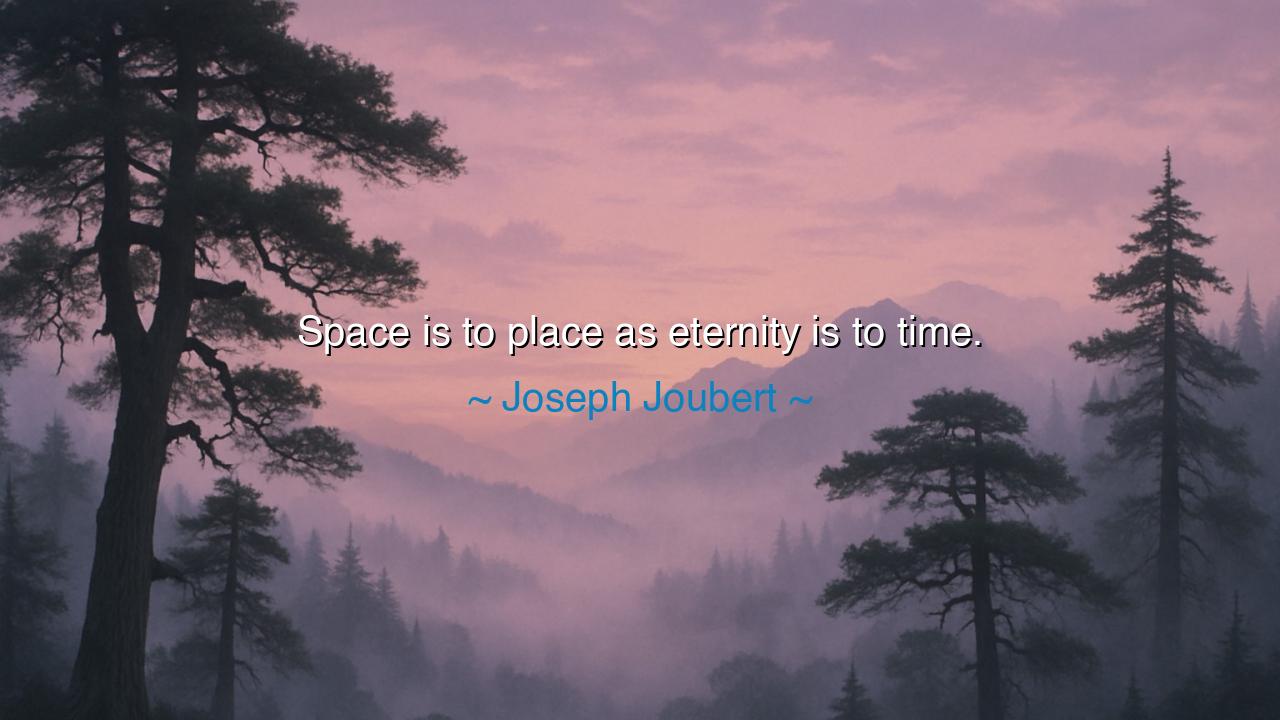
Space is to place as eternity is to time.






In the vastness of the universe, there is a truth that has perplexed and inspired humankind for as long as we have gazed at the heavens: the relationship between space and time. The ancient sages and philosophers, from the time of Plato to the teachings of the Buddha, sought to understand the very fabric of existence—the nature of being and becoming, of the eternal and the temporal. The great Joseph Joubert, a philosopher of the 18th century, distilled this profound truth into a simple yet powerful insight: "Space is to place as eternity is to time." These words, though brief, speak to a cosmic understanding of existence, suggesting that just as space and place are connected, so too are eternity and time, both profound concepts that shape the lives of all who wander the Earth.
Space, that infinite canvas upon which the stars and planets are painted, is a mystery that has long captivated humanity. The ancients, such as the Babylonians and Greeks, viewed the heavens as the domain of the gods, and space itself was a realm of divine power and mystery. Aristotle, the great Greek philosopher, viewed space as the empty void that separated all things. But it was not until the age of the Renaissance, when figures like Galileo and Kepler looked to the skies with telescopes, that the true nature of space began to unfold. They revealed that space was not merely a void, but an expansive realm where celestial bodies moved according to predictable laws. Joubert’s words touch upon this mystery: just as space provides the dimension for place, so does eternity provide the infinite context for time.
In the same way, time—that invisible force that shapes our days, our lives, and our civilizations—is a concept that has mystified and guided us for millennia. The ancients understood time in cyclical terms: the rising and setting of the sun, the phases of the moon, the changing seasons—all reflected the eternal rhythms of nature. Yet, as Newton and later Einstein revealed, time is not merely a linear progression, but a dimension that is deeply intertwined with space, creating what we now understand as space-time. Joubert’s quote calls attention to this union, suggesting that while time is a force we experience and measure in moments, eternity is the infinite backdrop against which time unfolds, much like space is the backdrop to the places within it.
Consider, for example, the journey of the ancient seafarers—men like Hernán Cortés and Vasco da Gama, who sailed across unknown oceans in search of new lands. As they set sail into the vastness of the sea, they faced the seemingly infinite space of the ocean. But their goal was always a place—a specific point, a destination that would define their journey. Similarly, in their minds, their journey was framed within the concept of time, as they charted the course of their days and months at sea. For them, space was the endless canvas on which their travels occurred, and time was the measure that guided their path. Their journey, as grand as it was, was but a small dot in the eternal expanse of space and the infinite sweep of time.
In our own lives, we often find ourselves caught between the pull of space and time. We are beings who live in the here and now, moving through places that are defined by the dimensions of space and the flow of time. But we are also dreamers, who yearn for the eternal—whether it be through our pursuit of wisdom, our search for meaning, or our desire to leave a lasting legacy. Joubert's words invite us to see that, while we experience life in the confines of space and time, we are always, in some way, connected to the infinite eternity that surrounds us, shaping our very existence.
The lesson here is both humbling and inspiring: we are not just creatures bound to the surface of the Earth, confined by the ticking of the clock. We are part of a much larger and more profound continuum. Just as space gives shape to the places we inhabit, so does eternity give meaning to the fleeting moments of time. To live fully is to embrace both: to ground ourselves in the physical world, in the places and moments that shape our days, but also to recognize the infinite eternity that surrounds us. In knowing both, we find peace in the transience of our lives and the vastness of the cosmos.
So, let us take action in our lives with both awareness and humility. Let us explore the places of our existence with purpose and clarity, yet always with an eye toward the eternal, understanding that our lives, our actions, and our very selves are part of a vast cosmic journey. Just as space contains the places we call home, eternity contains the time of our lives, and within it, we find both our purpose and our connection to the infinite. In this dance between space and time, we are both grounded and free, both small and vast, as we embrace the full spectrum of existence.






AAdministratorAdministrator
Welcome, honored guests. Please leave a comment, we will respond soon